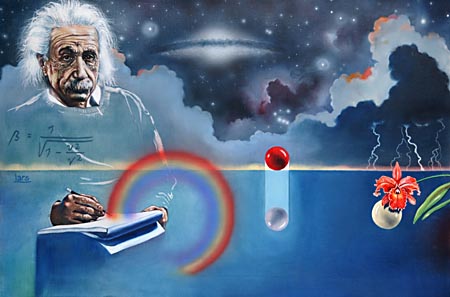 Yesterday's posting presents the argument that religion and science are usually and unnecessarily understood metaphorically as being two domains occupying separate territories in conflict with each other. It's a useful metaphor for those who want to wage war on each other or profit from that war. It is also a false metaphor that gets us into all sorts of trouble.
Yesterday's posting presents the argument that religion and science are usually and unnecessarily understood metaphorically as being two domains occupying separate territories in conflict with each other. It's a useful metaphor for those who want to wage war on each other or profit from that war. It is also a false metaphor that gets us into all sorts of trouble.OK. So, what do things look like if we reject the territorial metaphor? One example might come from Michael Ruse's 1999 "Review of Stephen Jay Gould's 'Rocks of Ages," in which he critique's Gould's contention that religion and science are "non-overlapping magisteria" (NOMA). Ruse argues that NOMA effectively forces theists to have to constantly give away to science because science "rules supreme" in the "empirical realm." Ruse worries that a strict construction of the boundary between science and religion puts unjustifiable constraints on the freedom of religious people. He concludes, "One is denying [them] the right to revise and reinterpret one's faith in the light of scientific advances." He criticizes Gould for not allowing theologians do that very thing, namely reinterpret Christian doctrine in light of scientific findings. As an agnostic he wants to give theists the "right to explore and develop their beliefs in the light of modern science."
Ruse doesn't seem to realize that Christian thinkers have long exercised that right and many continue to do so today. Since the days when the earliest church began to articulate its Jewish faith in Greek philosophical terms, Christian theologians have regularly and even aggressively used contemporary thought to restate our faith. They didn't looked on those philosophies as being enemy territory but rather is being resources for discovering new aspects of our faith. There is every reason to use scientific findings that way in our day. When we're not engaged in a zero-sum game protecting the purity of our theological turf, we are free to accept the truth of those findings and learn from them. They don't change our faith in Christ as Lord and Saviour. They don't deny the presence of the Spirit in daily life. And they only serve to expand our understanding of God as Creator.
People of faith who embrace evolution, in short, gain a great deal and lose nothing by walking away from the turf war going on between creationism and scientism. That's not to say we ignore it so much as to say that we persist in seeing the relevance of both science and faith for understanding and living in our world. They are resources for living. Perhaps we should revive the old-fashioned non-territorial metaphor of God being revealed to us in two books, the Book of Nature and the Book of Faith (a.k.a the Book of Revelation, the Book of God).